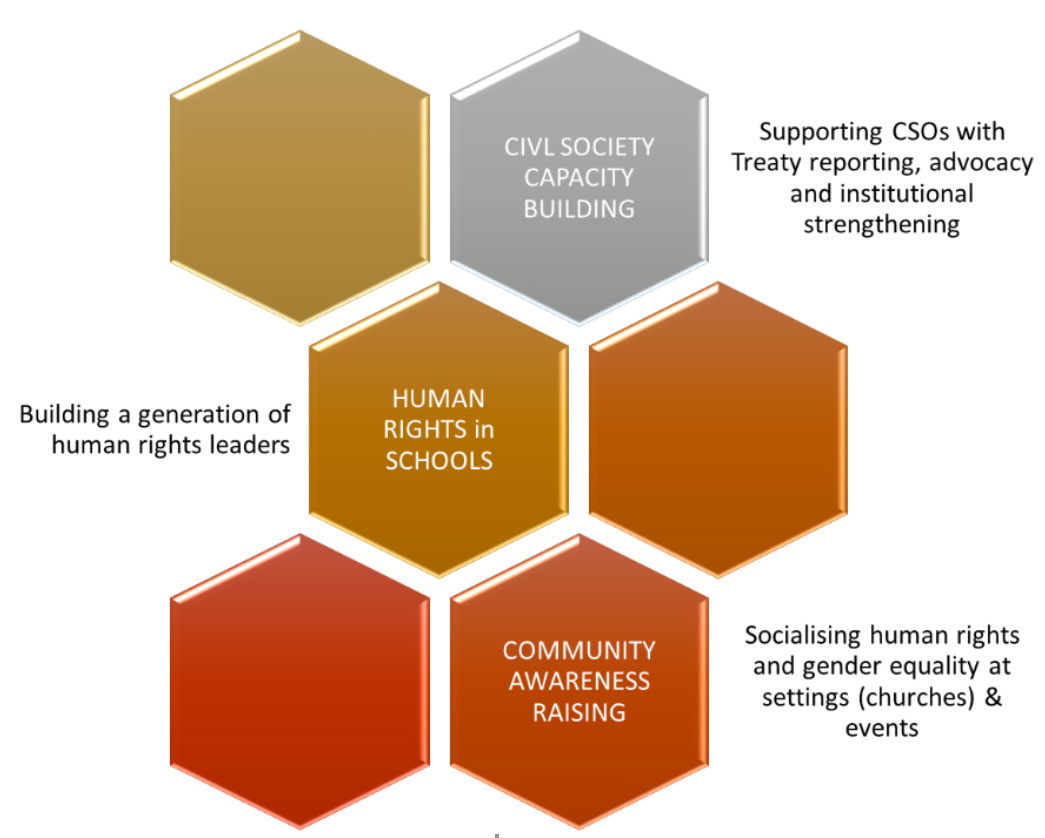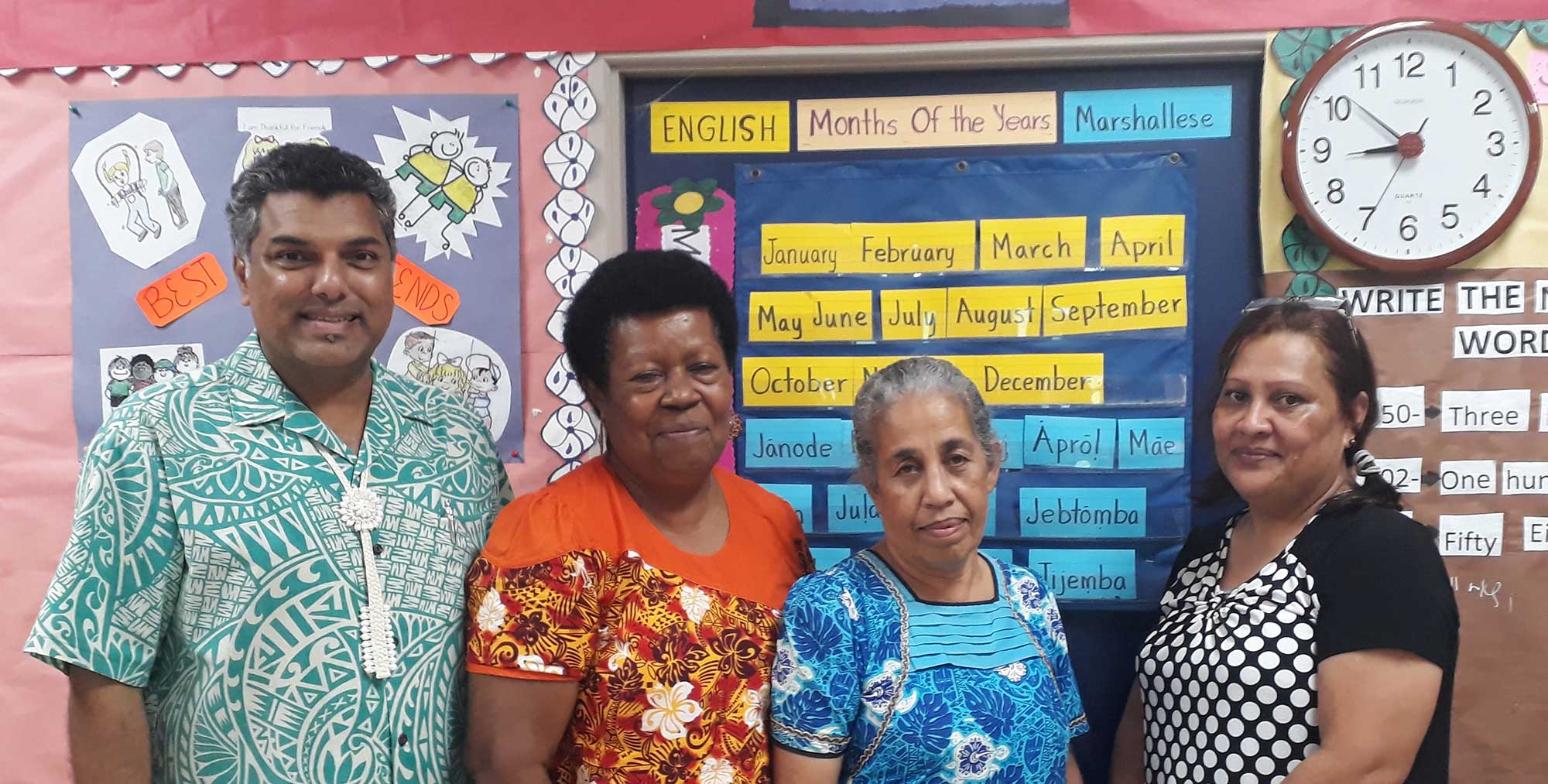Civil society and communities promote human rights, gender equality and ending violence against women
Key development partners are the European Union in the Pacific, Ministries of Education and schools, civil society organisations, churches, the LGBTQI+ community and the Pacific Sexuality and Gender Diversity Network.
The results we are striving for:

To achieve this, RRRT is building the capacity of civil society to advocate for human rights advances, as well as increasing awareness and changing attitudes within communities around human rights and gender equality. A strong civil society that can advocate and engage in advancing human rights is a critical aspect of building and sustaining a culture of human rights. In addition, widespread advances in human rights will not occur without changes to entrenched attitudes among communities around equality and social inclusion. This requires a concerted focus on building a culture of gender equality, human rights and social citizenship within schools.
The elimination of all forms of discrimination is of fundamental importance to the creation of an enabling environment for the progressive realisation of human rights for all. RRRT provides capacity development support to CSOs and advocacy groups, including in the EVAW, climate change, environmental protection and LGBTQI+ sectors to:
- Build skills and capabilities to advocate effectively for human rights;
- Engage in international human rights reporting; and
- Leverage national and international human rights law to advance advocacy issues.
The expected result is that Pacific civil society has increased agency to demand accountability; to contribute to dialogue and decision-making for more sustainable development and to influence human rights monitoring, reporting and implementation.
Key activities in Pacific Island countries include technical assistance and training in:
- Preparing shadow reports on key United Nations Conventions such as the Convention on the Elimination of Discrimination Against Women and Girls (CEDAW), the Convention on the Rights of the Child (CRC), and the Convention on the Rights of People with Disabilities (CRPD);
- Lobbying for legislative change or for changes within organisations that promote anti-discrimination; and
- Planning and implementing successful advocacy campaigns under the Pacific People Advancing Change project (PPAC).
Progress against our targets:
Result 3.1: CSOs have increased capacity to monitor and advocate for human rights
| Number of RRRT-supported campaigns that were successful in policy and legislative change or other human rights advancements | Target: 5 | Current Value: 11 |
| Number of RRRT-supported civil society campaigns progressing towards campaign objectives | Target: 10 | Current Value: 27 |
| Number of CEDAW shadow reports submitted | Target: 9 | Current Value: 8 |
| Number of CRC shadow reports submitted | Target: 5 | Current Value: 1 |
| Number of CRPD reports submitted | Target: 5 | Current Value: 3 |
| Evidence of strengthened civil society advocacy for LGBTQI persons (groups) | Target: 4 | Current Value: 4 |
| % civil society members reaching competency in human rights advocacy and lobbying | Target: 75% | Current Value: 73% |

Currently, aside from Kiribati, no country in the Pacific has a substantive human rights curriculum at the school level. RRRT sees this as an opportunity to challenge and end the pervasive gender and other stereotypes that schools reinforce by offering to Ministries of Education a human rights education package that can be adapted to the local context. HRE is an essential part of the right to education, specifically the right to know, seek and receive information about all human rights and fundamental freedoms. It is also an important tool to advance the values of equality, dignity and respect that underlie human rights, and develop the skills and attitudes to promote gender equality, anti-discrimination and non-violence in daily life.
At its core, HRE follows principles of non-discrimination and inclusion, participation, accountability and empowerment through learning and teaching. RRRT views HRE as empowering children and the school community with knowledge and a critical consciousness to analyse the world around them, and take action to bring about positive social change. Understanding that learning is an integral aspect of life, HRE is transformational in that teachers and students engage in a deliberate, participatory and learner-centred practice that nurtures freedom of expression, constructive dialogue and critical analysis rooted in their own experiences and knowledge.
Starting in schools, modules revolve around dignity and mutual respect, civic literacy and social citizenship, child rights and responsibilities, and gender equality and social inclusion. Teachers will be trained on human rights, equity and social inclusion, and participatory and activity-based methodologies. Parents and communities also will be engaged to foster an environment that is conducive to their children’s learning to respect, protect and promote human rights. Working towards a ‘whole-school’ and rights-based approach, which goes beyond the classroom and into all aspects of school life, HRE in schools should lead empowered children and teachers to create an inclusive environment where all take an active part in school life, regardless of status or role, and learn about human rights by putting them into practice every day.
RRRT carries out its work in schools in partnership with SPC’s Educational Quality and Assessment Programme and SPC’s Social Development Programme under the Pacific Partnership to End Violence Against Women and Girls.
Key RRRT activities in Pacific Island countries include technical assistance and training in:
- Reviewing curricula and developing new curriculum documents;
- Developing teaching and learning materials that support human rights education; and
- Conducting community outreach through awareness-raising activities on human rights.
Progress against our targets:
Result 3.2: More schools and communities promote human rights, gender equality and ending violence against women:
| Number of Pacific Island Countries with evidence of schools promoting human rights, gender equality, and ending violence against women | Target: 3 | Current Value: 3 |
| Number of Pacific Island Countries with schools developing or implementing human rights curriculum | Target: 4 | Current Value: 4 |
| Evidence of community outreach on human rights and gender equality | Target: 9 | Current Value: 8 |



